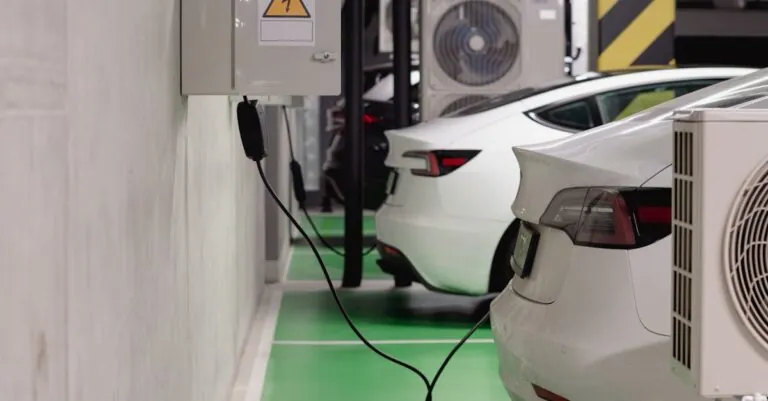Thinking about going electric? You’re not alone. With rising gas prices and a growing concern for the environment, more people are trading in their gas guzzlers for sleek electric rides. But before they zoom off into the sunset, there’s a little thing called financing to figure out.
Table of Contents
ToggleUnderstanding Electric Car Financing
Electric car financing involves several options that help buyers manage costs effectively. Options vary, and understanding them can simplify the purchasing process.
Benefits of Financing an Electric Car
Financing an electric car offers several advantages for buyers. Lower monthly payments can ease budget constraints, allowing for a more manageable cash flow. Tax incentives and rebates often come with purchasing electric vehicles, which can further reduce overall costs. Additionally, financing can provide access to higher-priced models that might otherwise be out of reach. Enhanced fuel efficiency reduces fuel costs significantly, making electric cars a financially sound long-term investment. Many manufacturers also offer competitive financing rates, enhancing affordability.
Key Factors to Consider
Several key factors influence the financing process for electric vehicles. Credit scores play a crucial role in determining eligibility and loan terms. Loan duration impacts overall costs as well, with shorter terms usually creating a higher monthly payment but lower interest costs. Buyers should evaluate total ownership costs, considering maintenance, charging infrastructure, and insurance, which can differ from gasoline vehicles. Lastly, comparing financing options from various lenders is essential for securing the best rates.
Financing Options Available
Electric car buyers can choose from several financing options that best suit their financial situations. Each option offers unique benefits, making it essential to evaluate them carefully.
Traditional Car Loans
Traditional car loans provide a straightforward route to financing an electric vehicle. Buyers typically secure a loan through a bank or credit union, often offering competitive interest rates. Monthly payments vary based on the loan amount and duration, influencing overall cost. Credit scores greatly impact interest rates, so maintaining a good score is crucial. Many lenders allow for flexible terms, giving buyers the freedom to customize payment plans according to their budgets.
Leasing vs. Buying
Leasing presents an alternative to buying an electric car outright. Monthly lease payments tend to be lower than loan payments, making it easier for many to afford an electric vehicle. Leasing usually covers the vehicle’s warranty, reducing maintenance costs over time. However, mileage limitations may apply, which could influence driving habits. Purchasing a vehicle leads to full ownership, offering benefits such as equity and no mileage restrictions, allowing for greater flexibility.
Manufacturer Financing Programs
Manufacturer financing programs often provide attractive terms for new electric car buyers. These programs sometimes include lower interest rates or cashback incentives, making electric vehicles more affordable. Some manufacturers also offer special leasing options tailored to electric models, enhancing overall value. Buyers should compare these programs with traditional loans to ensure they choose the best available offer. Specific terms and availability depend on geographic location and individual dealership policies.
Government Incentives and Rebates
Government incentives and rebates play a crucial role in making electric vehicles (EVs) more affordable for consumers. Various programs exist at the federal, state, and local levels.
Tax Credits for Electric Vehicles
The federal government offers a tax credit of up to $7,500 for eligible electric vehicles purchased after December 31, 2020. Credit amounts depend on the vehicle’s battery capacity, with specific manufacturers qualifying based on sales figures. Some states provide additional tax credits or rebates on top of the federal incentive, further reducing overall costs. Buyers should consult the IRS website or a tax professional to ensure they maximize their credits. To benefit from these programs, prospective owners must complete proper documentation during tax filing.
State and Local Incentives
Many states implement their own incentives to encourage electric vehicle adoption. These can include rebates, reduced registration fees, and exemptions from sales tax. For instance, state-level incentives may vary significantly, with some areas offering up to $5,000 in rebates. Local governments occasionally support charging infrastructure, making it easier for EV owners to charge their vehicles. Researching specific incentives based on one’s location is necessary to take full advantage of available programs. Keeping updated on changes to policies can also reveal additional savings opportunities.
Tips for Securing the Best Financing Deal
Securing favorable financing for an electric car significantly impacts overall costs. Buyers can take several steps to secure the best deal.
Improving Your Credit Score
Improving a credit score enhances the chances of obtaining better financing terms. Monitoring credit reports regularly helps identify discrepancies, which can then be disputed. Consistently paying bills on time fosters a positive credit history. Keeping credit utilization below 30 percent shows lenders responsible financial behavior. New credit applications should be limited, as too many inquiries can lower scores. These strategies can elevate credit scores, leading to lower interest rates and improved financing offers.
Comparing Interest Rates
Comparing interest rates across lenders is vital for finding the most affordable option. Researching multiple financial institutions, including banks and credit unions, uncovers various offers. Evaluating annual percentage rates (APRs) provides insight into the true cost of borrowing. Utilizing online tools and calculators can aid in determining potential monthly payments. Negotiating terms with dealers often results in better rates and conditions. Taking time to compare options ensures buyers secure the best financing deal for an electric car.
Financing an electric car opens up a world of possibilities for drivers looking to make an eco-friendly switch. By understanding the various financing options available and taking advantage of government incentives, buyers can significantly reduce their overall costs.
It’s crucial to evaluate personal financial situations and compare offers from different lenders to secure the best rates. With careful planning and informed decisions, transitioning to an electric vehicle can not only be affordable but also a smart investment for the future. Embracing this change contributes to a sustainable lifestyle while enjoying the benefits of modern automotive technology.




